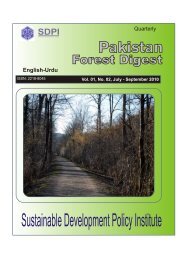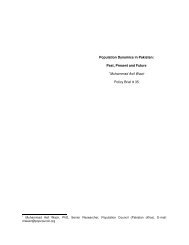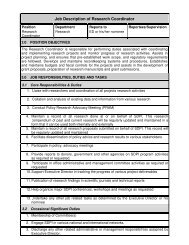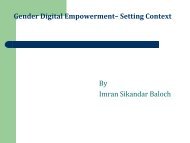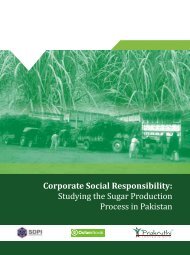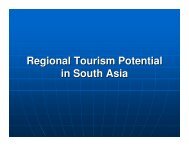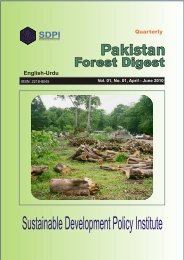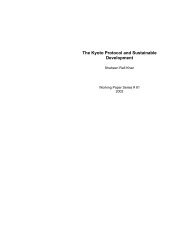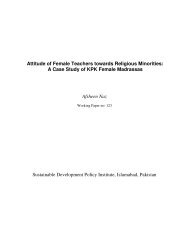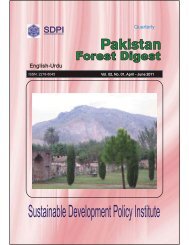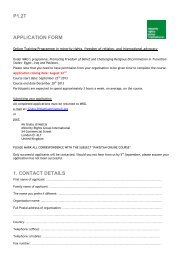Annual Report 2009-10 - Sustainable Development Policy Institute
Annual Report 2009-10 - Sustainable Development Policy Institute
Annual Report 2009-10 - Sustainable Development Policy Institute
- No tags were found...
You also want an ePaper? Increase the reach of your titles
YUMPU automatically turns print PDFs into web optimized ePapers that Google loves.
tentials for trade in the region are enormous but remain unrealized due to huge restrictions imposedby either side.Speaking at a panel on 'Global Financial Crisis: Response of South Asia', experts highlightedtrends towards backward labor migration from industrial urban areas to the rural sector that resultsin the concentration of greater poverty in rural areas. Moreover, panelists linked the effectsof the financial crisis in the region with increases in domestic violence and divorce rates, anddescribed the crisis as “drastically affecting food prices” and nutrition intake. Dr. Shakuntala Narasimhan,columnist and author from India, said a majority of export-oriented manufacturingunits have either been closed down or have reduced wages and cut jobs, increasing pressureon workers.On the second day of the conference, National Assembly Member and member of the StandingCommitteee on IT, Ms Marvi Memon, said that there is a dire need to empower women throughICTs during the session on 'Women and ICTs in South Asia: Exclusion or Empowerment?'. Dr.Karin Astrid Siegmann Lecturer, Labour and Gender Economics, <strong>Institute</strong> of Social Studies(ISS), The Hague, Netherlands and Visiting Fellow at SDPI, elaborated on the difficulties of usingICTs as a tool of women's empowerment, noting that cultural norms often present an obstaclein the Government's efforts to provide affordable access to Information and CommunicationTechnologies to the rural population. Ms Nazima Shaheen, Project Coordinator, SDPI, and Dr.Anupma Saxena from India also presented their papers on the topic.In a panel on 'Pakistan's Military Offensive, the IDP Crisis and Prospects for Taming Militancy',panelists concluded that building a bridge between the locals, the army and the government fora streamlined way forward towards rehabilitation is necessary. With representatives from themilitary, IDP coordination agencies as well as local community leaders participating in the panel,heated discussion surrounded claims of military collusion in terrorist organization, leading thediscussion towards issues of trust in the authorities and local relations with civilian and militarybodies.Issues of food security including discussion of the nexus between food insecurity and militancywere explored during two separate panels on food security. Panelists agreed that Pakistanfaces a perilous situation with regard to food security, urging the government to take action. Dr.Suleri presented research that found that within a volatile food security situation prevailingacross the country, conflict-ridden regions of Balochistan and NWFP exhibited the country'sworst statistics on food security.The concurrent panel on "The Economics of Ecosystems and Biodiversity" was headed by Dr.Pushpam Kumar of the University of Liverpool, England. With relevance to South Asia, he emphasizedthat policy makers do not have all the right tools and (economic) frameworks to validatethe damage and reimbursements related to environmental degradation. Prof. John Gowdy,President of the International Society for Ecological Economics; Prof. Madhu Verma of Indian<strong>Institute</strong> of Forest Management, India; and, Dr. Rehana Siddiqui from Pakistan <strong>Institute</strong> of <strong>Development</strong>Economics (PIDE) also spoke on the panel.Other panels on the second day of the conference included 'Alternative Textbooks for Socialand Political Harmony' and a panel on the 'National <strong>Sustainable</strong> <strong>Development</strong> Strategy', the latterin which government and civil society came together to critically discuss the Strategy.A session on 'Climate Change and Chemicals' Use: Adaptation and Mitigation Measures forMinimizing the Emerging Environmental and Health Impacts' emphasized the changing nature ofchemicals with climate change impacts, calling for the government to address rising issues inchemical pollution, especially with regard to lead poisoning. Another panel titled 'Civil-MilitaryRelations and the Political Economy of Military Intervention' was also held in which speakersfrom India, Nepal, Germany and USA spoke on the subject.<strong>Annual</strong> <strong>Report</strong><strong>2009</strong> - 20<strong>10</strong>55S u s t a I n a b l e D e v e l o p m e n t P o l I c y I n s t I t u t e



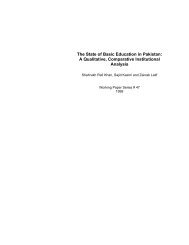
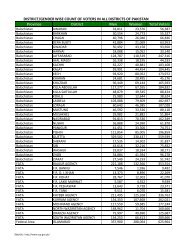
![(October - December, 2010) [13th SDC Special Bulletin]](https://img.yumpu.com/50118608/1/184x260/october-december-2010-13th-sdc-special-bulletin.jpg?quality=85)
